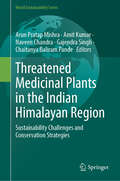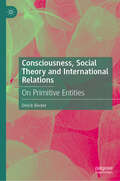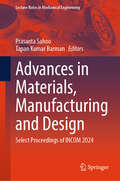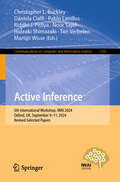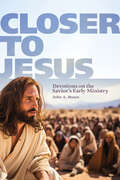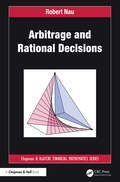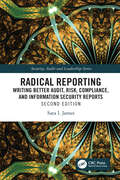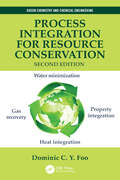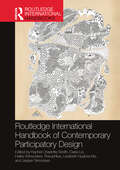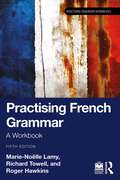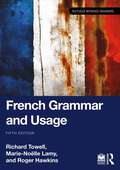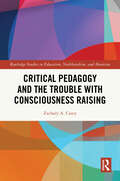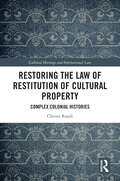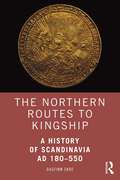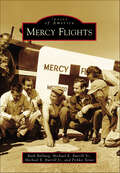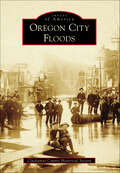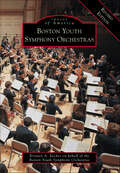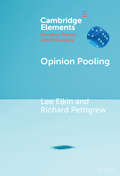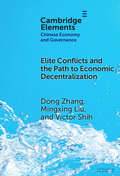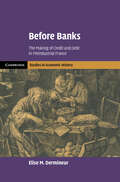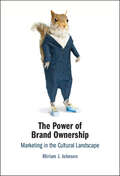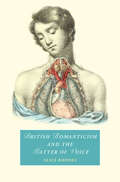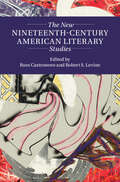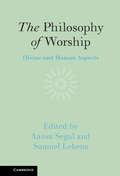- Table View
- List View
Threatened Medicinal Plants in the Indian Himalayan Region: Sustainability Challenges and Conservation Strategies (World Sustainability Series)
by Amit Kumar Gajendra Singh Naveen Chandra Chaitanya Baliram Pande Arun Pratap MishraThe book provides an in-depth analysis of the major issues related to the conservation of threatened medicinal plants in the Indian Himalayan region. The book is a comprehensive resource and sustainability of challenges and conservation strategies that highlights the critical role of medicinal plants in traditional healthcare systems and identifies the significant threats that these plants face due to various anthropogenic and natural factors. The book covers ten major themes that are critical to understanding the sustainability conservation of threatened medicinal plants in the Indian Himalayan region. It provides an essential resource for researchers, policymakers, and practitioners interested in the sustainability conservation of threatened medicinal plants in the Himalayan area. The book provides an overview of the major issues related to medicinal plant sustainability conservation and suggests strategies for the sustainable management of these plants. The authors have provideda comprehensive and insightful analysis of the sustainability conservation status of medicinal plants in the region, highlighting the urgent need for concerted efforts to conserve these valuable resources.
Consciousness, Social Theory and International Relations: On Primitive Entities
by Derick BeckerThis book engages contemporary research in the neurobiology of consciousness, specifically how Integrated Information Theory (IIT) understands and models consciousness as an emergent phenomenon. In a thorough yet accessible discussion of IIT, the book explores the implications of IIT for social science and International Relations theory, particularly concerning the emergent nature of social and political systems. It is intended to be accessible to non-specialists and professional social scientists alike. The idea is to put forward a bold set of ideas that engage longstanding and contemporary debates in a format that is useful to scholars while remaining clear and cogent enough for the novice. The author’s intention is to balance the scholarly in an accessible way primarily by making a few focused scholarly points elaborated with minimal esoteric language and relying on endnotes.
Advances in Materials, Manufacturing and Design: Select Proceedings of INCOM 2024 (Lecture Notes in Mechanical Engineering)
by Prasanta Sahoo Tapan Kumar BarmanThis book presents select papers from the International Conference on Mechanical Engineering (INCOM 2024), describing recent advances in materials, manufacturing, and design of mechanical components. Various topics covered in this book are additive manufacturing, automation in manufacturing system, CAM, CAD-CAM, CIM, composite materials, computational solid and structural mechanics, engineering system design, functionally graded composites and smart materials, laser material processing, mechanics of composite materials, mechatronics, control and robotics. The book is a valuable reference for researchers and professionals working in the field of materials, mechanical and design engineering.
Active Inference: 5th International Workshop, IWAI 2024, Oxford, UK, September 9–11, 2024, Revised Selected Papers (Communications in Computer and Information Science #2193)
by Tim Verbelen Pablo Lanillos Christopher L. Buckley Daniela Cialfi Noor Sajid Hideaki Shimazaki Martijn Wisse Riddhi J. PitliyaThis book constitutes the revised selected papers of the 5th International Workshop on Active Inference, IWAI 2024, held in Oxford, UK, during September 9–11, 2024. The 17 full papers included in this book were carefully reviewed and selected from 54 submissions. They were organized in topical sections as follows: Modeling Behaviour and Emotions; Hybrid Continuous-discrete Systems; Structure Learning; Multi-agent Systems; Epistemic Sampling; Robot Control; and Sustainability and Contextuality.
Closer to Jesus
by John BraunHow much do you know about Jesus' early ministry? Jesus started his ministry in the region of Galilee. There he called his first apostles and attracted many large crowds as he began preaching, teaching, and doing miracles. Just as his powerful words and loving actions drew people in then, so too can they draw you in today, bringing you closer to him. In these 55 brief devotions, author John Braun traces the course of Jesus' early ministry, offering personal, spiritual insights and clear convictions of Jesus' true purpose. As you read Closer to Jesus, you'll grow in your appreciation and understanding of your Savior's redeeming work for you!
The Highland Widow (Hesperus Classics)
by Stuart Kelly Walter ScottA party on the Highland Tour comes upon a miserable hut hidden away among a patch of cliffs. Upon inquiring about what lies before them, the ladies hear the wretched tale of Elspat MacTavish, the Highland Widow, who is condemned forever to live penitent and alone. After the suppression of the Highland clans, the widow's son, Hamish, sets off with honorable intentions of joining the coalition on its campaign against the French into America. But soon the unfortunate Hamish finds himself tricked by his own mother. The ensuing events produce a tragic ending made all the more pathetic by the unquenchable passion of a once-proud nation that continues to beat in the breast of one woman.
Arbitrage and Rational Decisions (Chapman and Hall/CRC Financial Mathematics Series)
by Robert NauThis unique book offers a new approach to the modeling of rational decision-making under conditions of uncertainty and strategic and competition interactions among agents. It presents a unified theory in which the most basic axiom of rationality is the principle of no-arbitrage, namely that neither an individual decision maker nor a small group of strategic competitors nor a large group of market participants should behave in such a way as to provide a riskless profit opportunity to an outside observer.Both those who work in the finance area and those who work in decision theory more broadly will be interested to find that basic tools from finance (arbitrage pricing and risk-neutral probabilities) have broader applications, including the modeling of subjective probability and expected utility, incomplete preferences, inseparable probabilities and utilities, nonexpected utility, ambiguity, noncooperative games, and social choice. Key results in all these areas can be derived from a single principle and essentially the same mathematics.A number of insights emerge from this approach. One is that the presence of money (or not) is hugely important for modeling decision behavior in quantitative terms and for dealing with issues of common knowledge of numerical parameters of a situation. Another is that beliefs (probabilities) do not need to be uniquely separated from tastes (utilities) for the modeling of phenomena such as aversion to uncertainty and ambiguity. Another over-arching issue is that probabilities and utilities are always to some extent indeterminate, but this does not create problems for the arbitrage-based theories.One of the book’s key contributions is to show how noncooperative game theory can be directly unified with Bayesian decision theory and financial market theory without introducing separate assumptions about strategic rationality. This leads to the conclusion that correlated equilibrium rather than Nash equilibrium is the fundamental solution concept.The book is written to be accessible to advanced undergraduates and graduate students, researchers in the field, and professionals.
Radical Reporting: Writing Better Audit, Risk, Compliance, and Information Security Reports (Security, Audit and Leadership Series)
by Sara I. James"If I were giving out an award for 'book of the year' for internal audit professionals, I would certainly award it to her outstanding manuscript: Radical Reporting: Writing Better Audit, Risk, Compliance and Information Security Reports." - Richard Chambers, Former President and CEO, The Institute of Internal AuditorsMost people dread writing reports; they also dread reading reports. What they don’t realize is that the techniques that make writing more readable make it more powerful. This is especially relevant for professionals in areas such as audit, risk, compliance, and information security.This small volume provides the tools and techniques needed to improve reports. It does so through addressing crucial concepts all too often overlooked in the familiar rush to perform tasks, complete projects, and meet deadlines.These concepts – the role of culture in communication; the link between logic and language; the importance of organizing thoughts before writing; and how to achieve clarity – may seem academic or theoretical. They’re not. Unless writers understand their own thoughts, actions, and objectives, they cannot hope to communicate them at all – let alone clearly.This second edition develops these points with additional material on critical thinking, as well as the use of AI in reporting.
Process Integration for Resource Conservation (Green Chemistry and Chemical Engineering)
by Dominic C.Y. FooTo achieve environmental sustainability in industrial plants, resource conservation activities such as material recovery have begun incorporating process integration techniques for reusing and recycling water, utility gases, solvents, and solid waste. Process Integration for Resource Conservation presents state-of-the-art, cost-effective techniques, including pinch analysis and mathematical optimization, for numerous conservation problems. The second edition of this best-seller adds new chapters on heat integration and retrofitting of resource conservation networks and features multiple optimization examples via downloadable MS Excel spreadsheets. Emphasizes the goal of setting performance targets ahead of detailed design following the holistic philosophy of process integration Explains various industrial examples step by step and offers demo software and other materials online Features a wealth of industrial case studies Adds chapters on heat integration, combined heat and power, heat-integrated water network, and retrofit of resource conservation network Adds new optimization examples and downloadable MS Excel files on superstructural approaches and automated targeting models for direct reuse, recycle and regeneration Ideal for students preparing for real-world work as well as industrial practitioners in chemical processing, the text provides a systematic guide to the latest process integration techniques for performing material recovery in process plants. The book features a solutions manual, lecture slides, and figure slides for adopting professors to use in their courses.
Routledge International Handbook of Contemporary Participatory Design (Routledge International Handbooks)
by Jesper Simonsen Rachel Charlotte Smith Heike Winschiers-Theophilus Liesbeth Huybrechts Daria LoiThis handbook offers a comprehensive overview of key themes and agendas in contemporary Participatory Design across diverse disciplines, continents, communities, and practices. Building on Participatory Design’s core values of empowerment and democracy, the handbook explores how the field is developing and diversifying to address contemporary societal challenges in a global community. Participatory Design actively engages peoples, groups and other actors in collaborative design processes to explore and co-create their everyday technologies, practices, and environments. In doing so, Participatory Design aims to address social justice and agency by including diverse actors in the collective shaping of alternative futures. Participatory Design embraces a diverse collection of principles and practices aimed at making technologies, environments, organisations and institutions more responsive to human and planetary needs. In this volume, a multidisciplinary and international group of highly experienced and recognised experts present an authoritative review of the contemporary field and discuss the diverse opportunities and challenges that arise from pivotal issues in Participatory Design, including scaling, collectives, sustainability and more-than-human, decolonisation, emerging technologies and AI, new approaches, methods and engagement beyond academia. The handbook advances contemporary research, theory and practice and highlights case studies that demonstrate how Participatory Design can bring about game-changing shifts in diverse contexts. The volume is an invaluable resource for students, researchers, scholars, and professionals who seek to utilise Participatory Design research and practice to enrich, support and transform complex contemporary conditions towards inclusive, sustainable and transitional futures.
Practising French Grammar: A Workbook (Practising Grammar Workbooks)
by Richard Towell Marie-Noëlle Lamy Roger HawkinsPractising French Grammar, fifth edition, offers a set of varied and accessible exercises for developing a practical awareness of French as it is spoken and written today.Practising French Grammar provides concise summaries of key grammatical points at the beginning of each exercise, as well as model answers to the exercises and translations of difficult words. The lively examples and authentic texts have been updated to reflect current usage.This is an invaluable resource for students and teachers of French at the intermediate to advanced levels.This book can be used alone or as the ideal companion to the fifth edition of French Grammar and Usage by Richard Towell, Marie‑Noëlle Lamy, and Roger Hawkins (available to purchase separately ISBN 978‑1‑032‑44463‑5). An Instructor and Student Resource site also accompanies the book and offers additional resources at https://routledgelearning.com/frenchgrammarandusage.
French Grammar and Usage (Routledge Reference Grammars)
by Richard Towell Marie-Noëlle Lamy Roger HawkinsLong trusted as the most comprehensive, up‑to‑date, and user‑friendly grammar book available, French Grammar and Usage is a complete guide to French as it is written and spoken today. It includes clear descriptions of all the main grammatical phenomena of French and their uses, illustrated by numerous examples taken from contemporary French, and distinguishes the most common forms of usage, both formal and informal.This book’s key features are as follows: comprehensive content, covering all the major structures of contemporary French user‑friendly organisation offering easy‑to‑find sections with cross‑referencing and indexes of English words, French words, and grammatical terms clear and illuminating examples to help students at all stages of their degree useful indications of what cannot be written or said as well as what can Revised and updated throughout, this new edition offers updated examples to reflect current usage, headers to include chapter number and section parts, as well as cross‑referencing for easier reference, and explanations of notoriously difficult points of grammar. This edition includes references to changes in French spelling now being introduced across French education and to social change towards inclusive writing.The combination of reference grammar and manual of current usage is an invaluable resource for students and teachers of French at the intermediate and advanced levels.This Grammar is accompanied by Practising French Grammar: A Workbook (available to purchase separately, ISBN 978‑1‑032‑44140‑5) which features related exercises and activities. An Instructor and Student Resource site also accompanies this book and offers additional resources at https://routledgelearning.com/frenchgrammarandusage
Critical Pedagogy and the Trouble with Consciousness Raising (Routledge Studies in Education, Neoliberalism, and Marxism)
by Zachary A. CaseyCritical Pedagogy and the Trouble with Consciousness Raising incisively critiques the consciousness-raising project that has been so central to contemporary critical pedagogy.The book argues that consciousness-raising work in formal educational settings over the past three decades has largely failed to advance social justice. By critiquing consciousness raising as an end in itself, the author employs a Marxist framework to highlight how consciousness raising alone cannot alter material conditions and realities. Consequently, the book illustrates how many pedagogical projects fail to transcend the idealist realm and impact the material world. Advocating for a materialist critical pedagogy that revisits Freirean principles of praxis and dialogue, the author proceeds to outline a politics of redistribution to invigorate future critical educational projects. From examining how discourse functions ideologically to uphold the status quo, to exploring how determinisms limit our life chances and imaginations, the author demonstrates that the challenges in achieving socially just education are largely self-imposed. The book concludes with a new approach to critical pedagogy that avoids reifying consciousness raising and reasserts the importance of praxis in all critical educational endeavors. It will appeal to scholars and researchers interested in critical pedagogy, the sociology of education, critical theory, and the philosophy of education.
Restoring the Law of Restitution of Cultural Property: Complex Colonial Histories (Routledge Studies in Cultural Heritage and International Law)
by Christa RoodtThis groundbreaking book covers the restoration of the law of restitution of cultural property, matching the time, space, and depth dimensions of the law with the time, space, and ontology of events that violated persons and desecrated their heritage in the colonial era.Using the contested ownership of the Parthenon Sculptures and the Zhanggong Zushi mummy encased in a Buddha statue as the main points of orientation, the book shows how the law of restitution could be ‘defragmented’ and ‘restored’ in respect of claims for the return of colonial-era and Indigenous cultural property disputes. The study argues that the secondary legal norms and common arguments of Private International Law can unlock governance functions and strategies that counter the effects of the narrow definition of the ‘sacred’ and the consistent refusal to consider an alternative chronosophy in restitution claims. When called upon to resist the detrimental effects of the mimetic dynamic in complex colonial contexts, the law stands to benefit from a legal-theoretical perspective that views law in relation to ethics and considers Private International Law, a model of ethics.The book will be of interest to researchers in the field of cultural property law, heritage studies, Indigenous law, provenance, and applied ethics.
The Northern Routes to Kingship: A History of Scandinavia AD 180–550
by Dagfinn SkreThis book argues that tribal Scandinavia was set on the route to kingship by the arrival in the AD 180s–90s of warrior groups that were dismissed from the Roman army after defeating the Marcomanni by the Danube. Using a range of evidence, this book details how well-equipped and battle-seasoned warriors, familiar with Roman institutions and practices, seized land and established lordly centres. It shows how these new lords acquired wealth by stimulating the production of commodities for trade with peers and Continental associates, Romans included, to reward retainers and bestow on partners. In these transcultural circumstances, lords and their retainers nurtured artisanal production of exquisite quality and developed a heroic ethos and refined hall etiquette. The topic of warfare, created by the volatile politics of lordly cooperation and competition, is also explored. Venturing substantially beyond the usual scope of syntheses of this period, this book looks at how the break-up of the Western Roman Empire and the rise of 'Great tribes' such as the Franks and Goths influenced lords and tribal leaders across Scandinavia to form kingdoms, emulating what they for centuries had considered the superior polity, the Roman Empire.This book’s fresh take on disputed research topics will inspire scholars, students, and interested readers to delve further into this pivotal period of European history.
Mercy Flights (Images of America)
by Ruth BallwegMercy Flights--America's first not-for-profit air ambulance service--was created in 1949 in direct response to the polio epidemic and medical transportation problems in Southern Oregon and Northern California. At that time, two small general hospitals provided basic medical care for the community of 17,000 residents. The nearest specialty hospitals for injuries and more complex care were in Eugene (167 miles), Portland (274 miles), and San Francisco (363 miles). Since the Interstate Highway System had not yet been built, these distances were very slowly traveled on two-lane roads. George Milligan, a young air traffic controller--and a pilot himself--mobilized the community to create Mercy Flights and recruited volunteer pilots and nurses to staff the service. The story of Mercy Flights is a grassroots account of heroism, service, creativity, tenacity, and strong community leadership.
Oregon City Floods (Images of America)
by County Historical SocietyNative American legends from times long ago tell of great floods that covered the earth in the Pacific Northwest. Early fur trappers describe the Willamette River as a sheet of water covering the land as far as the eye can see in the early 1800s. As American settlement of the Oregon Territory began in the 1840s, a great flood carried away many of the new businesses at the base of majestic Willamette Falls. Again and again the rivers rose, inundating the historic city to the north and south. But Oregon City, the first incorporated city in the Oregon Territory, survives, thrives, and grows despite these floods.
Boston Youth Symphony Orchestras Revised Edition (Images of America)
by Krysten A. KechesIn 1958, under the founding music director, Prof. Marvin Rabin, the Boston University College of Fine Arts established a youth orchestra for junior and senior high school students from the Greater Boston area. The Boston Youth Symphony Orchestras (BYSO), formerly known as the Greater Boston Youth Symphony Orchestras, has flourished over the past 60 years, impacting the lives of thousands of young musicians. BYSO members have experienced countless unforgettable moments, including performances at the White House, Carnegie Hall, and renowned concert venues across the world. Today, under the musical leadership of Federico Cortese, BYSO serves 500 students from over 120 communities throughout New England. BYSO is one of Boston's most prestigious arts organizations, with a programmatic scope that includes three full symphonic orchestras, two young string training orchestras, six chamber orchestras, a preparatory wind ensemble, a chamber music program, and a nationally recognized outreach program that provides rigorous instrument instruction to students from underrepresented communities. In 2008, BYSO established an opera program that has become an integral part of the season repertoire. BYSO has selected images from its extensive archives to exhibit its rich history.
Opinion Pooling (Elements in Decision Theory and Philosophy)
by Lee Elkin Richard PettigrewDisagreement is a common feature of a social world. For various reasons, however, we sometimes need to resolve a disagreement into a single set of opinions. This can be achieved by pooling the opinions of individuals that make up the group. In this Element, we provide an opinionated survey on some ways of pooling opinions: linear pooling, multiplicative pooling (including geometric), and pooling through imprecise probabilities. While we give significant attention to the axiomatic approach in evaluating pooling strategies, we also evaluate them in terms of the epistemic and practical goals they might meet. In doing so, we connect opinion pooling to some philosophical problems in social epistemology and the philosophy of action, illuminating different perspectives one might take when figuring out how to pool opinions for a given purpose. This title is also available as Open Access on Cambridge Core.
Elite Conflicts and the Path to Economic Decentralization (Elements in Chinese Economy and Governance)
by Dong Zhang Mingxing Liu Victor ShihWhy would a politically centralized state embark on the path of economic decentralization? This Element delves into the political origin of the puzzling economic decentralization in mainland China. The authors contend that the intra-elite conflicts between the authoritarian ruler and the ruling elites within the state prompted the ruler to pursue decentralization as a strategy to curb the influence wielded by the ruling elites. By examining the composition of the Chinese Communist Party's Central Committee, they find that the Cultural Revolution, fueled by elite conflicts, shifted the elite selectorate's composition from favoring central agencies to favoring local interests. Subsequent low turnover reinforced this shift, aligning elite incentives with decentralization policies and committing the Chinese leadership to a decentralized path in the 1980s. Additionally, Taiwan's economic liberalization under the Kuomintang's authoritarian rule provides further evidence of the link between ruling party elite composition and economic policy orientation.
Before Banks: The Making of Credit and Debt in Preindustrial France (Cambridge Studies in Economic History - Second Series)
by Elise M. DermineurThis innovative work delves into the world of ordinary early modern women and men and their relationship with credit and debt. Elise Dermineur focuses on the rural seigneuries of Delle and Florimont in the south of Alsace, where rich archival documents allow for a fine cross-analysis of credit transactions and the reconstruction of credit networks from c.1650 to 1790. She examines the various credit instruments at ordinary people's disposal, the role of women in credit markets, and the social, legal, and economic experiences of indebtedness. The book's distinctive focus on peer-to-peer lending sheds light on how and why pre-industrial interpersonal exchanges featured flexibility, diversity, fairness, solidarity and reciprocity, and room for negotiation and renegotiation. Before Banks also offers insight into factors informing our present financial system and suggests that we can learn from the past to create a fairer society and economy.
The Power of Brand Ownership: Marketing in the Cultural Landscape
by Miriam J. JohnsonHow do brands cultivate loyalty and influence consumer purchasing decisions? The Power of Brand Ownership explores the complex dynamics between branding and consumer identity within both the physical and digital realms that form our cultural landscape. Miriam J. Johnson uncovers a symbiotic relationship where brands serve not merely as navigational aids in a consumer's journey but also as integral components of self-identity and social projection, and the power that entails. Investigating the nuances of power shifts, brand authenticity, activism, and the gendered nature of consumption, Johnson asserts that brands are both influenced by and influencers of the cultural terrain they inhabit as well as the temporal contexts in which they interact. Theoretical frameworks articulate the fluidity of capital within the consumer-brand nexus whilst insightful case studies illustrate industry examples, revealing the shifting strategies employed by companies to make brands identifiable and desirable in the ever-changing cultural landscape.
British Romanticism and the Matter of Voice (Cambridge Studies in Romanticism)
by Alice RhodesPhysiological, political, and poetic studies of the relationship between the human body and voice saw increased attention and took on new significance in British literature of the politically turbulent period between the 1770s and the 1820s. Focusing on Erasmus Darwin, John Thelwall, and Percy Bysshe Shelley, three writers whose works draw together the fields of science, politics, language, and literature, and who were subject to charges of political radicalism and materialist philosophy, Alice Rhodes draws attention to a developing theory of spoken and poetic utterance which, for its subscribers, suggested a fundamental, material, and reciprocal connection between the speaking body and the physical, social, and political worlds around it. By investigating the Romantic-era fascination with the mechanics and physiology of speech production, she explores how Darwin, Thelwall, and Shelley came to present the voice as a form of physical, autonomous, and effective political action.
The New Nineteenth-Century American Literary Studies (Twenty-First-Century Critical Revisions)
by Robert S. Levine Russ CastronovoThe New Nineteenth-Century American Literary Studies takes stock of critical developments over the past twenty years, offering a fresh examination of key interpretative issues in this field. In eclectic fashion, it presents a wide range of new approaches in such areas as print and material culture, Black studies, Latinx studies, disability studies, gender and sexuality studies, postsecular studies, and Indigenous studies. This volume also maps out new directions for the future of the field. The evidence and examples discussed by the contributors are compelling, grounded in case studies of key literary texts, both familiar and understudied, that help to bring critical debate into focus and model fresh interpretive perspectives. Essays provide new readings and framings of such figures as Herman Melville, Harriet Wilson, Charles Chesnutt, Edgar Allan Poe, Washington Irving, and Zitkála-Šá.
The Philosophy of Worship: Divine and Human Aspects
by Aaron Segal Samuel LebensWorship is central to the lives of billions of people worldwide. Yet, despite the recent flourishing of analytical philosophy of religion, there has been very little attention paid to the philosophical questions raised by worship. This book is the first volume to explore the philosophy of worship. Written in a clear style that eschews unnecessary technical jargon, it considers the metaphysical, ethical, and psychological issues associated with worship, among them: What, if anything, is the point of worship? What, if anything, makes a being worthy of worship? Can worship hold value for atheists? What, if anything, might be wrong with idolatry? These questions, and more, sit at the heart of this book. With contributions from world renowned philosophers and important early career voices, this volume sets the agenda for future work in the philosophy of worship.
